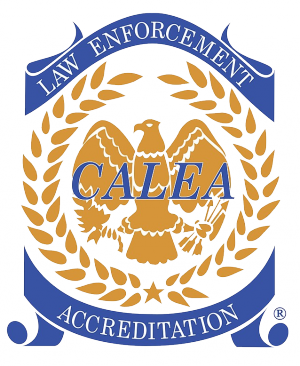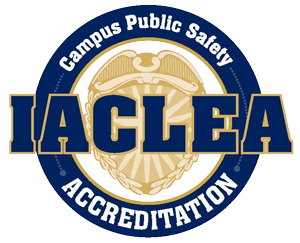 CALEA Accreditation
CALEA Accreditation
The Commission on Accreditation for Law Enforcement Agencies, Inc. (CALEA, www.calea.org) was established in 1979 by the four major police executive associations as an independent accrediting authority to develop a set of law enforcement standards and to establish and administer an accreditation process. The Commission's accreditation program requires police agencies to comply with state-of-the-art standards in areas such as policy and procedures, organizational management, law enforcement operations and support services.
Police agencies voluntarily enter the accreditation process which begins with a three year phase of self-assessment. During the self-assessment, the agency reviews its services, policies, practices, procedures, facilities and equipment for compliance with up to 460 professional law enforcement standards. Upon completion of the self-assessment phase, the agency participates in a "mock" on-site assessment where local assessors from other accredited police agencies review the candidate agency for compliance. After completion of the mock assessment, the agency makes any recommended adjustments and then participates in a formal on-site assessment from a team of assessors trained and selected by the Commission.
An agency's on-site assessment consists of four days of the assessors reviewing all agency policies, practices, and procedures; questioning agency staff and governing administrators; observing agency operations; and conducting both a public hearing and call-in comment session to verify the agency's compliance with the Commission's standards. Each member of the agency participates in the accreditation process at some level through policy and procedure review, inspections, training, assessor questioning or presentations to assessors during the assessment.
Following the on-site assessment, the assessment team prepares a report which is submitted to the Commission for review. Members of the agency administration then appear before a panel of Commissioners to answer questions about the agency and the final assessment report. At the end of the hearing, the Commission panel votes whether to recommend accreditation for the agency.
The agency must maintain compliance with applicable standards, keep its proofs of compliance up-to-date, and operate by the letter and spirit of those standards. To retain its accreditation status, the agency is required to submit to CALEA an Agency Annual Report. The annual report includes a summary of the agency's accreditation maintenance experience for the preceding year and a declaration of continued compliance with applicable standards. Every three years, the agency must participate in an on-site assessment and appear before a panel of Commissioners to be reaccredited.
 IACLEA Accreditation
IACLEA Accreditation
The International Association of Campus Law Enforcement Administrators, Inc. (IACLEA, www.iaclea.org), an association that represents campus public safety leaders at more than 1,000 institutions of higher education, offers IACLEA Accreditation to colleges and university law enforcement, security, and public safety agencies. IACLEA Accreditation constitutes recognition that an agency conforms to the highest professional standards for campus law enforcement and protective services.
The IACLEA Accreditation Commission has carefully selected 225 standards that impact officer and public safety, address high liability and risk management issues, and generally promote operational efficiency throughout the agency. Among these, are standards that are unique to a campus law enforcement environment. The IACLEA accreditation process is similar to the CALEA accreditation and an agency must be reaccredited with IACLEA every three years as well.